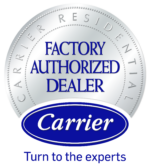As the weather warms up and spring arrives, seasonal allergies make a comeback. Individuals with allergies often experience symptoms such as runny noses, itchy eyes, and sneezing. It’s not just external factors that contribute to these symptoms; your heating and cooling system also plays a role. Dirty air filters, heat, and stagnant air can exacerbate allergies.
Fortunately, you can utilize your HVAC unit to help alleviate these symptoms. Here are some tips to enhance HVAC efficiency and create a healthier home.

1. Does Air Conditioning Help with Allergies?
Air conditioning can be a valuable tool in the fight against allergies. Not only does your cooling system keep your home comfortable during the hotter months, but it also plays a crucial role in filtering and circulating indoor air. By ensuring that your air conditioner is clean and running efficiently, you can greatly reduce the presence of indoor allergens and improve the overall air quality in your home.
2. Can a Dirty AC Filter Cause Allergies?
A dirty air filter can become a breeding ground for allergens, collecting dust mites, pollen, and pet dander over time. When you use your air conditioner, it circulates these irritants throughout your home. By regularly replacing or cleaning your filters, you can greatly reduce the levels of allergens. It is recommended to replace your air filter every one to three months, depending on your unit’s specifications and the severity of your allergies.
3. Does Heat Make Allergies Worse?
While heat may provide comfort on chilly days, it can actually worsen allergy symptoms by intensifying the presence of pollutants and allergens in the air. The combination of heat and moisture in the air leads to an increase in humidity levels, which can promote the growth of mold – a common trigger for allergies. However, by ensuring that your HVAC system is properly maintained, you can effectively regulate humidity levels in your home and alleviate allergy symptoms.
Additional Ways to Combat At-Home Allergens
Consider these proactive steps for optimizing HVAC performance and reducing allergens in your home:
-
Regular Maintenance:
Schedule annual AC inspections to ensure it’s free of leaks, blockages, and inefficiencies that could worsen allergy symptoms.
-
Upgrade Filters:
Invest in high-efficiency particulate air (HEPA) filters for your HVAC system. HEPA filters can capture particles as small as 0.3 microns, removing nearly all allergens from the air.
-
Clean Your Air Ducts:
Clean your air ducts or hire a professional technician to remove irritants before they spread throughout your home.
Remember, maintaining your HVAC system is a powerful tool in combating common allergens. By following these tips, you can have peace of mind knowing that your HVAC system is operating efficiently and circulating clean air throughout your home.


